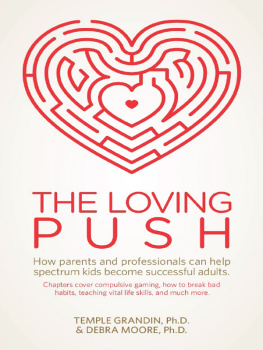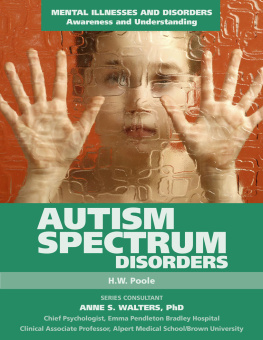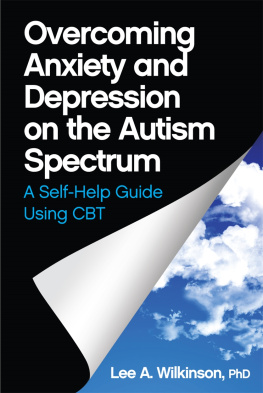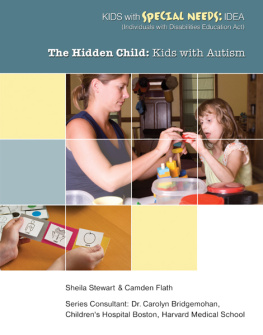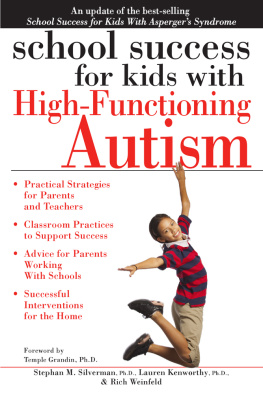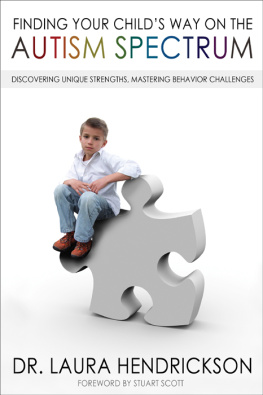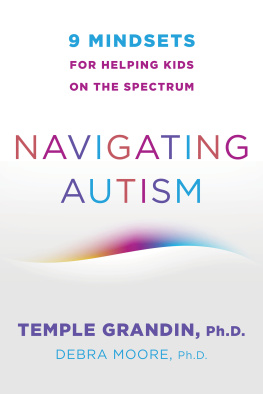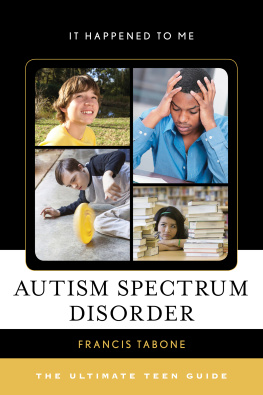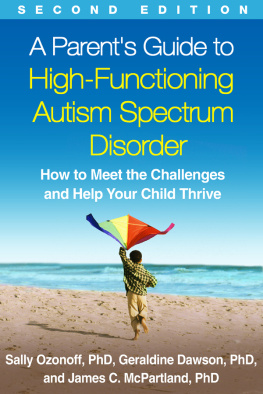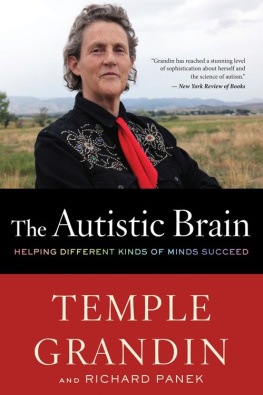

How parents and professionals can help
spectrum kids become successful adults.
Temple Grandin, Ph.D.
Professor of Animal Sciences, Colorado State University
Debra Moore, Ph.D.
Psychologist, Sacramento, CA
The Loving Push: Whats Holding ASD Kids Back & How to Change It
All marketing and publishing rights guaranteed to and reserved by:

721 W Abram St, Arlington, TX 76013
800-489-0727 (toll free)
817-277-0727 (local)
817-277-2270 (fax)
E-mail:
www.fhautism.com
2015 Temple Grandin and Debra Moore
Cover design by Robert Morrow
Cover illustration courtesy of iStock/Getty Images
Interior design by John Yacio III
All rights reserved.
Printed in the United States of America.
Photo of Temple Grandin Rosalie Winard.
No part of this product may be reproduced in any manner whatsoever without written permission of Future Horizons, Inc, except in the case of brief quotations embodied in reviews.
ISBN: 9781941765203
eISBN: 9781941765296
To our mothers, Eustacia Cutler and
Alma Rebecca Moore, who invariably
provided loving pushes, some appreciated
at the time, others not so much.
In retrospect, we are extremely grateful.
In memory of Oliver Sacks, M.D. (1933 - 2015)
M other knew that she had to stretch and lovingly push me just outside my comfort zone so I could develop to my fullest. She was always urging me to try new things but she made sure there were no surprises, because a sudden introduction of something new was scary. I was lucky to get into a good speech therapy program at age 2 and after I learned to talk, she always gave me many opportunities to use my speaking skills. In our family, all the children had to do the job of party hostess and host. At age seven or eight, I had to put on my best clothes and greet the guests who had been invited over for dinner. This taught important skills such as shaking hands and greeting people. My two younger sisters and brother also had to greet all the guests and help serve the snacks. In the 1950s, all children were taught social skills in a much more structured manner. My brother hated being a party host, but later in life, he admitted that it helped him talk to older men. This helped him become a senior vice president of a large bank. Even the normal kids benefitted from practicing learning to greet and talk to new people.
Debra Moore and I decided to collaborate on this book because we are both seeing more instances where fully verbal older children and young adults with ASD (autistic spectrum disorder) are not learning crucial basic skills for socializing and employment. We are both very worried about these youth, because without these skills, they are unlikely to be able to lead successful, independent, satisfying adult lives. If parents, teachers, and therapists of all sorts recognize the danger zones for these children, however, we can turn this around. That is our intent in writing this book.
At many different conferences, I am seeing a pattern of four things that are preventing smart children and adults with ASD from making a successful transition to full independence. Debra has seen these same concerns in the youth and families she worked with. These four things are a result of changes happening in our families, schools, and the world of technology.
1. ASD youth are being overprotected and not given enough opportunities to learn how to do things on their own. Too frequently, parents, teachers, or aides do things for the child that deprive him or her of the opportunity to make mistakes and thereby learn to solve problems on their own. For example, when I give talks, I meet teenagers with good speaking skills, but their parent does all the talking for the child. One time a mom started to ask a question for her child, and I said, Your child needs to ask the question. In this and most cases, I have been able to coax the child to talk, even in front of many people. They are then happy that they were able to do it. To help the child keep his nerve, I will warn the audience to hold applause until after the child has responded. Many kids with ASD just need additional time to get their words out.
I think moms often run interference for their children because they are afraid their child will be hurt when he/she makes a mistake. But to learn and grow, you have to make some mistakes. For example, my first attempt at teaching a class when I was in graduate school was a disaster. I panicked and walked out. To solve this problem, the next time I had prepared really good slides so if I panicked, I could fall back on them.
2. Our educational system has changed. Too many schools have removed the hands-on classes where many ASD or ADHD children or teenagers can excel. Classes such as art, music, cooking, sewing, woodworking, theatre, electrical repair, welding, and auto repair expose students to careers. A student cannot determine whether or not he likes something if they are never exposed to it. Patrick Stewart, who played Captain Picard on Star Trek, developed his love of acting when he was 12 and had the experience of performing in a school play.
Our kids need exposure both to open their eyes to options, and also to give them some preliminary experience in different things that could lead to a career. Parents and other adults in their lives have to take over what the schools used to do. We have to get our kids introduced to adults working in fields that could lead to careers. Some really good jobs where kids could excel are computer programming, skilled trades such as auto mechanics, and careers in the arts. Computer coding and the skilled trades are two areas where employersare having a hard time finding sufficiently qualified workers. These are areas of job opportunities.
We can take our childrens special interests and broaden them to many areas with potential for work. For example, if a teenager likes cars, we can use that interest to improve their reading (giving them auto magazines or instruction manuals), their math, and even physics.
3. Too many students with ASD are graduating from high school without having learned basic life skills they need as a young adult. These skills are necessary if they plan to attend college, get a job, or live independently without supervision. Some of these fundamental skills are driving or navigating public transportation, reliably being on time, having good social manners, maintaining basic hygiene, being able to follow instructions, seeing tasks through to completion, and being able to receive feedback appropriately.
We can prepare our children by having them do household chores from an early age, and do paid or volunteer work outside the home once they reach their teenage years. We have devoted a chapter to how to help your child learn these basics so they can succeed at work, in college, and maintaining a household.
4. Excessive video game playing has derailed too many kids. Too often I hear a parent tell me Hes 21 and he wont leave the bedroom. We are now discovering that those on the autism spectrum are especially vulnerable to obsessive gaming to the point of addiction. Our book has an extensive chapter on how to prevent problem video gaming and how to work with it if a child, teen, or adult has already become addicted.
The Loving Push: Some More Examples
Next page
